Mary is True Theotokos.
 Folks, let's talk about Our Lady, the Blessed Mother of our Lord, Mary, since today is the Solemnity of her dignity as Mother. That's why we call her Theotokos.
Folks, let's talk about Our Lady, the Blessed Mother of our Lord, Mary, since today is the Solemnity of her dignity as Mother. That's why we call her Theotokos.What does the title Theotokos mean? The Greek word, Theotokos, means in literal translation "God - Birthgiver (Theos - God; tokos - birthgiver. It is translated directly into Slavonic as bogoroditsa, and into Latin as Dei Genitrix. Because the term translated directly into English, namely "God-Birthgiver" is awkward in English speech, the preferred translation is MOTHER OF GOD. We acknowledge, however, that birthgiver and mother are not identical. The Greek word, tokos, is limited to birthgiving, whereas the English word "mother" includes birthgiving and many other tasks. (Source)
During the late 4th and early 5th centuries the theological debates in the Church shifted from Trinitarian concerns to the very nature of Christ. Eventually the dispute over the nature of Christ was brought to a head by Nestorius, Archbishop of Constantinople, who championed the cause of those who claimed that the two natures of Christ, human and divine, were separate, distinct and independent. Nestorius declared that there existed between the two natures only a moral union, i. e. the two natures were united in love but separated in essence. This meant, of course, that there was no room for the divine maternity of Mary. If there are two distinct persons in Jesus Christ, Mary would be the mother of the human person only. Thus the reference to Mary as Mother of God (Theotokos) was anathema to the Nestorians who preferred to refer to Her as "Christotokos" (Mother of Christ). (Source)
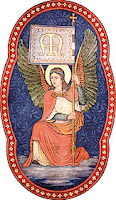 The orthodox party led by St. Cyril, Patriarch of Alexandria, moved quickly to resolve the issue. Unable to convince Nestorius of his errors, St. Cyril appealed to Pope Celestine I who condemned the teachings of Nestorius at a Roman Council held in August, 430. Nestorius remain adamant , whereupon the Emperor Theodosius II summoned an ecumenical council of the Universal Church which met in Ephesus in Asia Minor in 431. The Council of Ephesus, the Third Ecumenical Council of the Church (see account thereof in OTHER SITES herein) was not a happy event; it was rife with real controversy and chicanery, but orthodoxy eventually triumphed with the Edict of Union in 433. This rested upon the principle that there is in Christ a union of two natures in one Lord and that the Holy Virgin is the Mother of God (Theotokos). (Source)
The orthodox party led by St. Cyril, Patriarch of Alexandria, moved quickly to resolve the issue. Unable to convince Nestorius of his errors, St. Cyril appealed to Pope Celestine I who condemned the teachings of Nestorius at a Roman Council held in August, 430. Nestorius remain adamant , whereupon the Emperor Theodosius II summoned an ecumenical council of the Universal Church which met in Ephesus in Asia Minor in 431. The Council of Ephesus, the Third Ecumenical Council of the Church (see account thereof in OTHER SITES herein) was not a happy event; it was rife with real controversy and chicanery, but orthodoxy eventually triumphed with the Edict of Union in 433. This rested upon the principle that there is in Christ a union of two natures in one Lord and that the Holy Virgin is the Mother of God (Theotokos). (Source)Following the Council, Nestorianism was condemned throughout the Empire, but took refuge in Persia where a heretical church was organized. Little remains of the Nestorian heresy today in the East. It remains, however, alive and flourishing in the West where it is an essential part of various Protestant and other deconstructionist theologies which reject the role of the Virgin Mary in the scheme of salvation. (Source)
The "formula of union" of the Council of Ephesus, 433, reads in pertinent part as follows:
We profess therefore that Our Lord Jesus Christ, the only Son of God, is true God and true man, constituted by a body and a rational soul: that He was engendered by the Father before all time as to His divinity, and as to His humanity, was born of the Virgin Mary in time for us and for our salvation; that He is consubstantial with the Father in His divinity, and consubstantial with us in His humanity; for one union was effected by the two
natures, and we acknowledge only one Christ, one Son, one Lord.
Because of this union, which is free from all admixture, we alsoSo it is that the title "Mother of God" or Theotokos came to be applied to Mary, for if we use any other title -- except perhaps, "Mother of the Lord" -- we would be denying a central tenet of the Christian faith, namely, that Jesus Christ is True God and True Man, joined hypostatically in One Person. One would think that in this day and age is difficult for knowledgeable Christians to fall into such a basic error, but here you have many Protestants who can't ask, or don't want to ask these questions, much less answer them. Heck, I don't want to pick on Protestants, there are way too many Catholics who find themselves in the same situation, and therefore are equally spiritually impoverished as a consequence. Today's Antiphon for the Morning Prayer's Canticle of Zechariah summarizes the Mystery of Mary's Divine Motherhood:
acknowledge that the Blessed Virgin is the Mother of God,
because God the Word was made flesh, was made man, coalesced
with the Temple (His humanity), which He took from Her.(Source)
Marvelous is the mystery proclaimed today: man's nature is made new as God becomes man; he remains what he was and becomes what he was not. Yet each nature stays distinct for ever undivided.and the one from the Evening Prayer's Canticle of Mary:
Blessed is the womb which bore you, O Christ, and the breast that nursed you, Lord and Savior of the world, alleluia.This is the perennial faith of the Apostles, this is the faith of the Fathers, this is the faith of the Church. If you reject it knowingly, willfully, and freely, you can't be saved.
Happy New Year!


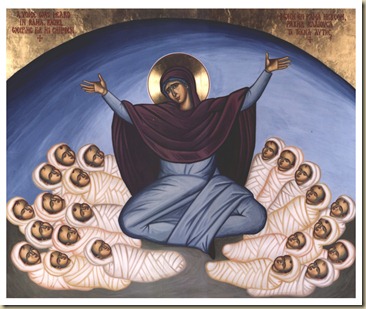


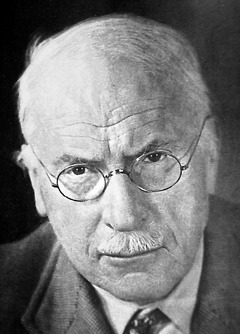 The book’s religious sensibility is thoroughly Gnostic, in a number of ways. It is, for one thing, simply saturated in imagery and concepts drawn from the Gnostic systems of late antiquity, and its narrative form—its incontinent mythopoeia, its rococo excesses, its figural syzygies and archons and aeons (or whatever one might call them)—has all the occult grotesquerie of authentic Gnostic myth. More to the point, its entire spiritual logic is one of “gnosis”: a saving wisdom vouchsafed through an entirely private revelation; a direct communication from a mysterious source that is also one’s own deepest ground, but from which one has become estranged; a truth attained not through the mediation of nature or culture, and certainly not through the moral “law,” but solely in the apocalyptic secrecy of the illuminated soul.
The book’s religious sensibility is thoroughly Gnostic, in a number of ways. It is, for one thing, simply saturated in imagery and concepts drawn from the Gnostic systems of late antiquity, and its narrative form—its incontinent mythopoeia, its rococo excesses, its figural syzygies and archons and aeons (or whatever one might call them)—has all the occult grotesquerie of authentic Gnostic myth. More to the point, its entire spiritual logic is one of “gnosis”: a saving wisdom vouchsafed through an entirely private revelation; a direct communication from a mysterious source that is also one’s own deepest ground, but from which one has become estranged; a truth attained not through the mediation of nature or culture, and certainly not through the moral “law,” but solely in the apocalyptic secrecy of the illuminated soul.
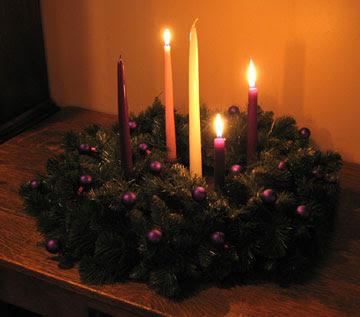 John is the voice, but the Lord is the Word who was in the beginning. John is the voice that lasts for a time; from the beginning Christ is the Word who lives for ever.
John is the voice, but the Lord is the Word who was in the beginning. John is the voice that lasts for a time; from the beginning Christ is the Word who lives for ever.
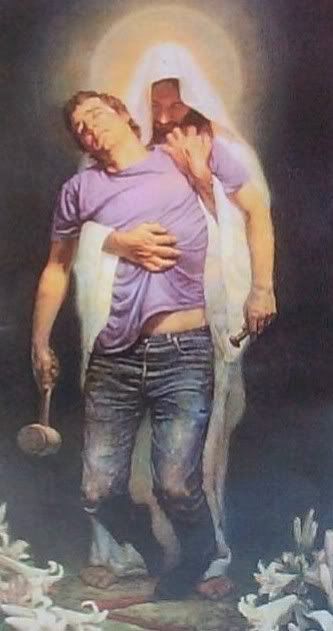 “How many times will I have to forgive my brother when he offends me?” Peter’s question is always current for a Christian: Where is the limit of our forgiveness? Do we have to forgive the offences always anew and without measure?
“How many times will I have to forgive my brother when he offends me?” Peter’s question is always current for a Christian: Where is the limit of our forgiveness? Do we have to forgive the offences always anew and without measure? The voice of one crying in the wilderness: Prepare the way of the Lord, make straight the paths of our God. The prophecy makes clear that it is to be fulfilled, not in Jerusalem but in the wilderness: it is there that the glory of the Lord is to appear, and God’s salvation is to be made known to all mankind.
The voice of one crying in the wilderness: Prepare the way of the Lord, make straight the paths of our God. The prophecy makes clear that it is to be fulfilled, not in Jerusalem but in the wilderness: it is there that the glory of the Lord is to appear, and God’s salvation is to be made known to all mankind.
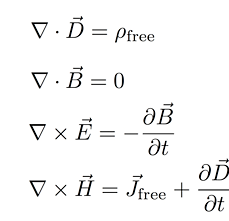

 We do not preach only one coming of Christ, but a second as well, much more glorious than the first. The first coming was marked by patience; the second will bring the crown of a divine kingdom.
We do not preach only one coming of Christ, but a second as well, much more glorious than the first. The first coming was marked by patience; the second will bring the crown of a divine kingdom.